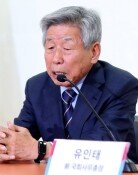Overseas Investors Dump Korean Stocks
Foreign investors have sold off domestic stocks for 10 consecutive days, from May 10-23. With this, the outflow of foreign investments this year amounts to 780 billion won.
The direct cause of this trend is the concern about the interest rates hike worldwide and belt-tightening policies.
With signs indicating a sluggish economy and the ending of the era of low interest rates, money that was originally invested in stock and real estate markets in emerging economies for the last three years is now being moved to safer assets such as gold and bonds.
On top of this current global trend of reducing asset bubbles, there are worries that Korea will be especially hit hard because of the governments recent announcement of bubble seven to push even harder with the real estate policy and a possible interest rate increase by monetary authorities.
The Three Bears Threatening the Global Economy-
The Wall Street Journal reported on Tuesday that the oil price, real estate bubble bursting, and inflation the three bears are threatening the goldilocks basis of the global economy.
Goldilocks refers to an ideal economy where the growth rate is high while inflation remains stable.
Governments of major countries and monetary authorities are busy coming up with countermeasures to avoid the threat of the three bears. The OECD forecasted in its half term report on Monday that for the first time since 2000, the U.S., Japan, and the EU will raise the interest rate at the same time (as a measure to prevent inflation).
The response of the markets to the belt-tightening movements of major countries was overly sensitive and explosive. The India exchange, a typical emerging market, plummeted by 10 percent on Monday, and transactions came to a halt for an hour.
The securities market, one of the representative financial assets, is following the slump of the raw material price.
Korean Government Says Not to Worry?-
The Korean exchange is no exception. This month alone, until Tuesday, it has dropped by 105.04 points (7.3 percent). The reason was the outflow of international investment funds.
Experts point out that although the ebbs of foreign investments do not directly affect the real estate market, it will have an indirect effect on investor confidence.
Hyundai Research Institutes economy division chief Yoo Byeong-gyu said, The fall in the securities market will undermine investor confidence, which will lead to a ceasing of transactions in the real estate market in the while. If a sluggish economy overlaps with this trend, it will have a negative effect on consumer sentiment as well.
Sogang Universitys economics professor Kim Kyung-hwan pointed out, Under these circumstances, the government needs to carefully observe what kind of results the existing policies will bring about, rather than to utter empty threats against the market.
Hyun-Jin Park Sun-Woo Kim witness@donga.com sublime@donga.com







